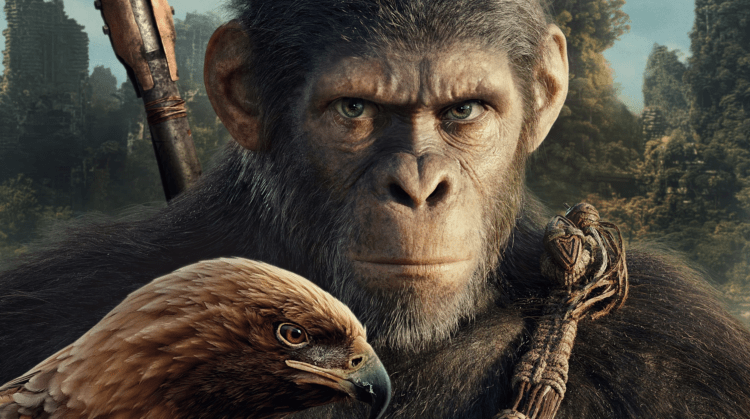
“What does it mean to be an ape?” is the question new protagonist Noa (Owen Teague) asks himself and the human Mae (Freya Allan) in the conclusion of “Kingdom of the Planet of the Apes.” An answer to this could also explain what happens to apes when they try to “be” human.
“Kingdom of the Planet of the Apes” is the fourth movie in the rebooted “Planet of the Apes” series as directed by Matt Reeves and Robert Wyatt. “Kingdom,” directed by Wes Ball, shows a classic Hero’s Journey that explores the world of the apes generations post Caesar, the reboot trilogy’s lead. On the surface, audiences may perceive this fourth film as unnecessary and contrived to keep the series alive. But with exciting direction and a host of new characters, a biting story unfolds bringing new life to a familiar world.
Ball has a tight grip on action and keeps viewers engrossed in every scene with a fast pace and character-building stakes. Our introduction to the new main character, Noa, is gushing with thrills as audiences discover who he is: An eagle trainer’s son who would do anything it takes for his father’s approval. In an intense scene, Noa faces a difficult set of climbs for eagle eggs. Mountain faces crumble, apes fall from great heights, and it’s all chased by a fiery scene of the invasion of Noa’s peaceful tribe by the Coastal Ape Colony.
Noa finds himself alone, without his father, without the eagles, without his tribe. With his mind set on revenge, Noa traverses where no ape in his tribe has ever gone in order to avenge his father and bring his community home.
On this adventure, Noa discovers the ruins of human society. Across generations, the knowledge of the rise of the apes and the fall of humans has been lost. Noa and his tribe only knew a skewed history of the world, even believing there were very few humans on earth, referring to them as “Echos” who lack intelligence. Noa comes across the ape Raka (Peter Macon) and human Mae. The three travel together to the coast as Raka shares his wisdom of the world and more importantly; Caesar. Noa learns about the relationships between humans and apes, and the memory and history of them has been lost. Raka invites a moral journey for Noa and Mae that they carry with them throughout the film.
Upon arrival to the coastal tribe, audiences discover a kingdom of kidnapped ape tribes living under the dictatorship of the ape Proximus Caesar (Kevin Durand). Proximus claims to follow the teachings of Caesar from many years ago and contorts Caesar’s words to align with his wants of evolution. Proximus abuses Caesar’s famous phrase “Apes stronger together” to justify his colonization of ape tribes. Under his regime, apes are enslaved, brainwashed, and sacrificed in the name of progress.
But Noa has learned about the real Caesar, and he knows what he came to the kingdom to do, and it is not to serve Proximus. Noa is exposed to two sides of the world and shoulders the burden of his knowledge.
So the question still stands: What makes one ape or human? Perhaps Proximus Caesar wasn’t just seeking evolution but chasing humanity, represented by the colonization tactics of Proximus reflecting human histories. And through Mae’s story, human intentions to take back the earth for humanity to and rule the way they did before the apes, looms over the new series, as if humanity “deserves” it.
Ball shares the intent to release two more movies, creating a new trilogy. These movies are bound to push and pull the boundaries of humanity.
The use of CGI is copious as expected, but with this, the film looks stunning. Ball stated in an interview that while actors were covered in cameras and dots to trace their movements, as much of the film as possible was shot in real locations, creating a more natural look. The dystopian look of rundown overgrown buildings and landscapes that viewers may be familiar with from Ball’s previous work like “Maze Runner” (2014) is extremely appealing.
Owen Teague‘s performance is undoubtedly a large reason audiences are able to be drawn into Noa’s character so quickly. His emotion is powerful and feels true to his character. Kevin Durand also steals the stage with his ominous presence despite holding a small portion of the lengthy runtime. No scene in the movie feels unnecessary or out of place allowing the cast and direction to flourish.
The best thing about “Kingdom of the Planet of the Apes” is that Caesar is respectfully laid to rest. We are reminded of the history, and he is harkened to in Proximus but by the end of the film, Noa does not become a leader in the same way as Caesar. Though it’s rather grim, the history of Caesar is nearly eliminated from the world of the apes.
For a series that wishes to continue making films, this is a fresh restart to the world that audiences are so familiar with. Watchers are taught a lesson about knowledge and nature, and they are given new grounds to view the world initiated by the “Kingdom of the Planet of the Apes.”







